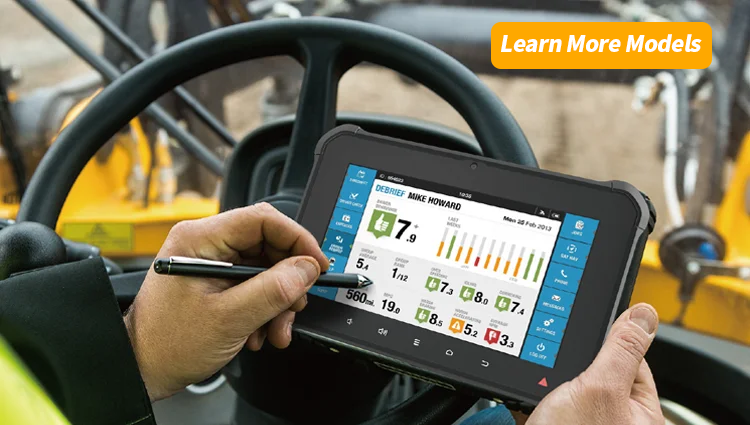Fleet Operations: A Comprehensive Guide to Vehicle Terminals
In the dynamic landscape of fleet operations, vehicle terminals play a pivotal role in streamlining logistics, enhancing safety, and improving overall efficiency. This guide delves into the world of vehicle terminals, exploring their functionality, types, and integration with fleet management systems to provide a comprehensive understanding of their importance in modern fleet management.
Understanding Vehicle Terminals
Vehicle terminals, also known as telematics devices, are hardware devices installed in vehicles to track and transmit data. They serve as the bridge between vehicles and fleet management systems, providing real-time information on vehicle location, speed, fuel consumption, and more.
Types of Vehicle Terminals
Vehicle terminals can be categorized into several types based on their functionality and the data they collect. These include:
- Basic GPS Trackers: These devices focus primarily on tracking vehicle location and providing basic trip information.
- Advanced Telematics Units: These terminals offer a suite of features, including diagnostics, fuel monitoring, and driver behavior analysis.
- Rugged Terminals: Designed for heavy-duty vehicles, these terminals can withstand harsh conditions and provide robust data collection capabilities.
Key Features of Vehicle Terminals
Modern vehicle terminals come equipped with a range of features that enhance their utility in fleet operations. Key features include:
- Real-time GPS Tracking: Provides live updates on vehicle location, enabling efficient route planning and asset management.
- Driver Behavior Monitoring: Analyzes driving habits to identify areas for improvement and promote safety.
- Fuel Management: Monitors fuel usage and helps identify potential fuel theft or inefficiencies.
- Diagnostics and Maintenance Alerts: Proactively alerts fleet managers to potential vehicle issues, reducing downtime.
Integration with Fleet Management Systems
The seamless integration of vehicle terminals with fleet management systems is crucial for maximizing their benefits. This integration allows for:
- Centralized Data Management: All vehicle data is collected and analyzed in a single platform, simplifying decision-making.
- Automated Reporting: Generates reports on vehicle performance, fuel consumption, and driver behavior, streamlining administrative tasks.
- Remote Vehicle Control: Enables remote actions such as locking/unlocking doors or disabling the engine in case of theft.
Benefits of Vehicle Terminals
Incorporating vehicle terminals into fleet operations offers numerous benefits, including:
- Enhanced Safety: By monitoring driver behavior, terminals can help reduce accidents and improve overall road safety.
- Improved Efficiency: Real-time tracking and diagnostics enable more efficient route planning and vehicle maintenance.
- Cost Savings: By identifying inefficiencies and preventing unauthorized use, terminals can help reduce operational costs.
- Compliance and Regulation: Terminals can assist in ensuring compliance with industry regulations and standards.
Challenges and Solutions
Despite their benefits, vehicle terminals can present challenges, such as:
- Installation and Maintenance Costs: The upfront and ongoing costs of installing and maintaining terminals can be significant.
- Data Privacy Concerns: Collecting and storing driver data raises privacy concerns that must be addressed.
- Solution: Implementing a phased rollout, providing clear communication about privacy policies, and opting for user-friendly terminals can mitigate these challenges.
Future of Vehicle Terminals in Fleet Operations
As technology advances, the role of vehicle terminals in fleet operations is expected to evolve. Future developments may include:
- Increased Integration with IoT: Terminals will become more integrated with the Internet of Things, enabling even more sophisticated data collection and analysis.
- Artificial Intelligence: AI-driven terminals will offer predictive analytics and autonomous decision-making capabilities.
- Cybersecurity Enhancements: As terminals become more connected, robust cybersecurity measures will be essential to protect sensitive data.
Frequently Asked Questions (FAQs)
- Q: What is the primary function of a vehicle terminal? A: The primary function is to collect and transmit data related to vehicle location, performance, and driver behavior.
- Q: How do vehicle terminals integrate with fleet management systems? A: They integrate through wireless communication, allowing real-time data sharing and analysis.
- Q: Can vehicle terminals improve fuel efficiency? A: Yes, by monitoring fuel usage and identifying inefficiencies, terminals can help optimize fuel consumption.
Conclusion
Vehicle terminals are indispensable tools in modern fleet operations, offering a range of benefits from safety to efficiency. As technology continues to advance, the capabilities of these terminals will only grow, further solidifying their role in the future of fleet management.








